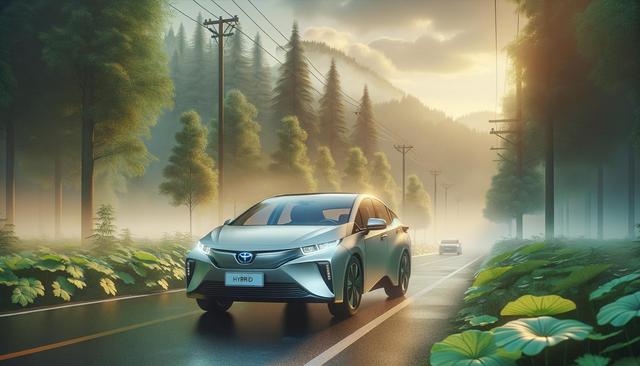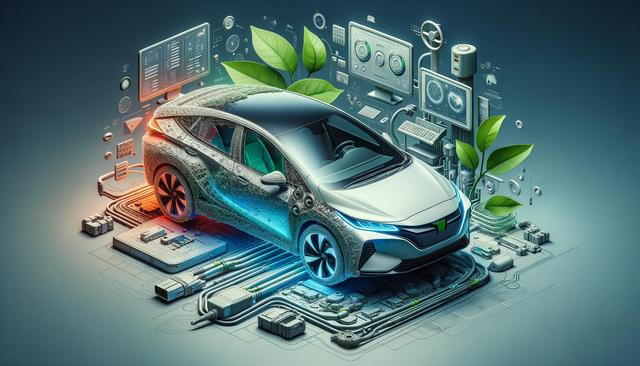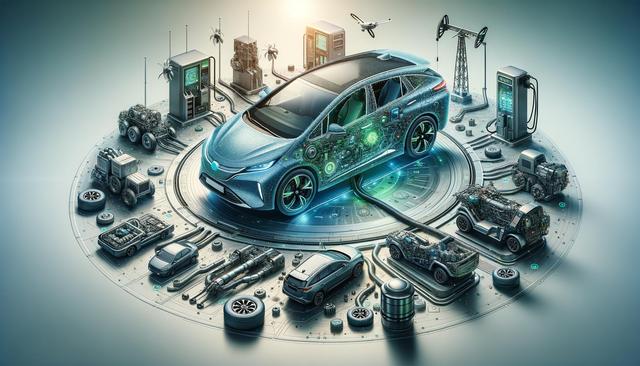What Are Hybrid Cars and How Do They Work?
A hybrid car combines a gasoline engine with an electric motor to power the vehicle. This dual system allows hybrids to optimize fuel consumption and reduce emissions. The electric motor is typically used at lower speeds or during light driving, while the gasoline engine kicks in when more power is needed, such as during acceleration or highway driving. This synergy between two power sources helps reduce fuel usage and contributes to a cleaner driving experience.
There are several types of hybrid systems available, including:
- Full hybrids: Can run on just the engine, electric motor, or both.
- Mild hybrids: Use the electric motor to assist the engine but cannot drive the car on electric power alone.
- Plug-in hybrids: Have a larger battery that can be recharged via an external power source, offering extended electric-only driving range.
Each type caters to different driving needs and habits, making hybrid cars a versatile choice for many consumers. For more information, visit: https://go.jexli.com/postback?clickId={click_id}&payout={epayout}&p2={campaign}
Benefits of Owning a Hybrid Vehicle
Hybrid cars offer a range of benefits that appeal to eco-conscious drivers and those looking to save on fuel costs. One of the main advantages is improved fuel efficiency. By utilizing both fuel and electricity, hybrid vehicles often require fewer stops at the gas station compared to conventional gas-powered cars.
Additional benefits include:
- Lower emissions: Reduced greenhouse gas output helps minimize your carbon footprint.
- Tax incentives: In some regions, hybrid car owners may qualify for government rebates or tax reductions.
- Quieter operation: Electric motors contribute to a quieter, smoother ride.
- Regenerative braking: This system captures energy normally lost during braking and reuses it to recharge the battery.
These advantages make hybrid vehicles a compelling option for those interested in sustainable transportation. Explore more here: https://go.jexli.com/postback?clickId={click_id}&payout={epayout}&p2={campaign}
Cost Considerations and Long-Term Savings
While hybrid vehicles often come with a higher initial purchase price than their conventional counterparts, many drivers find that the long-term savings offset the upfront cost. Reduced fuel expenses, potential tax incentives, and lower maintenance costs contribute to overall affordability over time.
Some of the financial factors to consider include:
- Fuel savings: Depending on your driving habits, you may save significantly on fuel.
- Maintenance: Hybrids generally experience less wear on their brakes and engines, leading to lower maintenance costs.
- Resale value: As demand for fuel-efficient vehicles increases, hybrid cars tend to hold their value well.
When evaluating the overall cost of ownership, it’s important to factor in these ongoing savings. Learn more about your options at: https://go.jexli.com/postback?clickId={click_id}&payout={epayout}&p2={campaign}
Environmental Impact and Sustainability
One of the key motivations for choosing a hybrid vehicle is the positive environmental impact. By relying on electric power for part of their operation, hybrids produce fewer harmful emissions than traditional vehicles. This contributes to better air quality and reduced dependency on fossil fuels.
Hybrid technology supports broader sustainability goals through:
- Lower carbon emissions: Helping cities and countries meet climate targets.
- Reduced noise pollution: Electric motors produce less sound than internal combustion engines.
- Energy efficiency: Hybrids use energy more efficiently, especially in stop-and-go traffic.
These environmental benefits make hybrid vehicles an attractive option for individuals looking to make greener choices. For further insights, go to: https://go.jexli.com/postback?clickId={click_id}&payout={epayout}&p2={campaign}
Technology and Driving Experience
Modern hybrid cars are equipped with advanced technology that enhances the driving experience. Features like regenerative braking, energy-saving driving modes, and real-time fuel economy monitoring help drivers optimize performance. Many models also come with amenities typically found in premium vehicles, such as touchscreen infotainment systems, driver assistance features, and advanced safety technology.
Key technology features available in many hybrid models include:
- Smart navigation systems: These can help find the most fuel-efficient routes.
- Eco-driving feedback: Real-time data helps drivers adjust habits for better fuel economy.
- Automatic start-stop: Saves fuel by shutting off the engine when idling.
These innovations contribute to a convenient and efficient driving experience. Discover more about what hybrid cars offer: https://go.jexli.com/postback?clickId={click_id}&payout={epayout}&p2={campaign}
Conclusion: Is a Hybrid Car Right for You?
Hybrid cars offer a compelling mix of efficiency, environmental benefits, and modern technology. Whether you’re commuting in a busy city or taking longer road trips, a hybrid vehicle can meet a range of driving needs while helping reduce your carbon footprint. With ongoing advances in hybrid technology and an increasing number of models to choose from, now is a great time to consider making the switch.
By understanding how hybrid systems work and evaluating the long-term financial and ecological benefits, drivers can make an informed decision. For those seeking a more sustainable and cost-effective way to drive, exploring hybrid options is a step in the right direction. Start your journey here: https://go.jexli.com/postback?clickId={click_id}&payout={epayout}&p2={campaign}



Leave a Reply